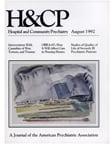Cultural Influences in Psychotherapy With Refugee Survivors of Torture and Trauma
Abstract
A selective review of the literature describing treatment of refugee survivors of torture and trauma revealed that approaches to psychotherapy used in treating South American patients differed from those used in treating Indochinese patients. South American patients were receptive to psychodynamic psychotherapeutic approaches that focused on detailed recollection of past trauma. lndocbinese patients responded to a broader-based rehabilitation approach that could include psychotropic medication, supportive psychotherapy, and assistance in meeting practical needs. The authors suggest that many of the differences in treatment of the two groups may be attributed to cultural factors, with South American patients reflecting an affinity for the Western philosophical assumptions in which psychodynamic therapy is rooted and indochinese patients reflecting a cultural background that values responsibility to the group, deference to authority, and restrained modes of emotional expression.
Access content
To read the fulltext, please use one of the options below to sign in or purchase access.- Personal login
- Institutional Login
- Sign in via OpenAthens
- Register for access
-
Please login/register if you wish to pair your device and check access availability.
Not a subscriber?
PsychiatryOnline subscription options offer access to the DSM-5 library, books, journals, CME, and patient resources. This all-in-one virtual library provides psychiatrists and mental health professionals with key resources for diagnosis, treatment, research, and professional development.
Need more help? PsychiatryOnline Customer Service may be reached by emailing [email protected] or by calling 800-368-5777 (in the U.S.) or 703-907-7322 (outside the U.S.).



